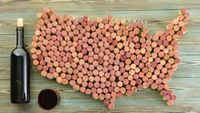In a significant escalation of trade tensions, U.S. President Donald Trump announced on April 2, 2025, a 20% tariff on Italian products, effective immediately, which has sent shockwaves through the Italian agro-food sector. This decision, made public from the Rose Garden at the White House, is expected to have dire consequences for Italy's economy, particularly for its wine exports, which account for a substantial portion of its agricultural exports to the United States, valued at approximately $2 billion, or 25% of the total wine export market.
Ursula von der Leyen, the president of the European Commission, expressed her deep regret over Trump's decision, labeling the tariffs as a "hard blow" to the global economy. Speaking from Samarkand, Uzbekistan, where she was attending an EU-Central Asia summit, von der Leyen stated, "We are ready to react" and confirmed that the EU is finalizing a package of countermeasures in response to the tariffs on steel and other products. She emphasized the importance of unity among European nations in facing these challenges, asserting, "If one of us is hit, we all are. So we will remain united and defend each other."
Von der Leyen highlighted that the tariffs would adversely affect millions of citizens, leading to increased bills and higher prices for essential goods, including pharmaceuticals. She reminded that the EU boasts the largest single market globally, with 450 million consumers, which should serve as a stronghold in turbulent times. "We have everything we need to weather this storm," she added, calling for dialogue instead of confrontation. "We will work to reduce barriers, not increase them," she stated, reiterating the EU's commitment to negotiate rather than retaliate.
The announcement of the tariffs came as a shock to Italian producers, especially those in the wine industry, who have been bracing for the impact of potential trade barriers since Trump threatened to impose tariffs of up to 200% on wine and spirits earlier in March. Francesca Poggio, a wine producer from the Gavi region in Piedmont, remarked, "While starting from 200%, the decision to apply 20% tariffs will create many difficulties, but our quality-price ratio should remain a strength." This sentiment was echoed by Martin Foradori Hofstatter, another prominent wine producer, who noted that the increasing costs would likely deter some American importers, leading to significant losses for Italian wine producers.
According to industry experts, the tariffs could result in a loss of up to 50% of Italian wine exports to the U.S., reminiscent of past trade disputes that severely impacted the sector. Federvini, Italy's wine producers' association, condemned the tariffs as a severe blow to free trade, affecting over 2 billion euros in exports, 40,000 businesses, and more than 450,000 jobs. Micaela Pallini, president of Federvini, stated that the tariffs represent a direct attack on the free market and warned of the devastating consequences for the entire supply chain, from production to distribution.
In light of this trade dispute, Italian Premier Giorgia Meloni has called for a measured response, urging European leaders to work together to avoid a full-blown trade war. Meloni's approach contrasts with von der Leyen's more aggressive stance on retaliatory measures. On the other hand, President Sergio Mattarella has also urged caution, emphasizing the need to prevent further escalation of tensions.
As the situation unfolds, the upcoming Vinitaly event, scheduled for April 6-9, 2025, will serve as a crucial platform for Italian wine producers to engage with American buyers. Despite the tariffs, approximately 10-12% of American top buyers have confirmed their attendance, signaling a continued interest in Italian wines.
Trump's announcement has been framed as part of a broader strategy to reclaim economic independence for the United States, with the president declaring, "This is a declaration of economic independence." However, the immediate fallout from these tariffs raises questions about the future of trade relations between the U.S. and Europe, particularly concerning Italy's vital agro-food sector.
Von der Leyen's remarks underscore the EU's commitment to defending its interests while seeking to negotiate a resolution to this trade conflict. "There is an alternative path, and it is not too late to address concerns through negotiations," she reiterated, emphasizing the need for collaboration over confrontation.
As both sides brace for the impact of the tariffs, the Italian agro-food sector faces a challenging road ahead, with many producers fearing significant losses in a market that has traditionally favored their high-quality products. The coming weeks will be critical in determining how the EU and Italy respond to these tariffs and whether a diplomatic solution can be reached to mitigate the economic fallout.






